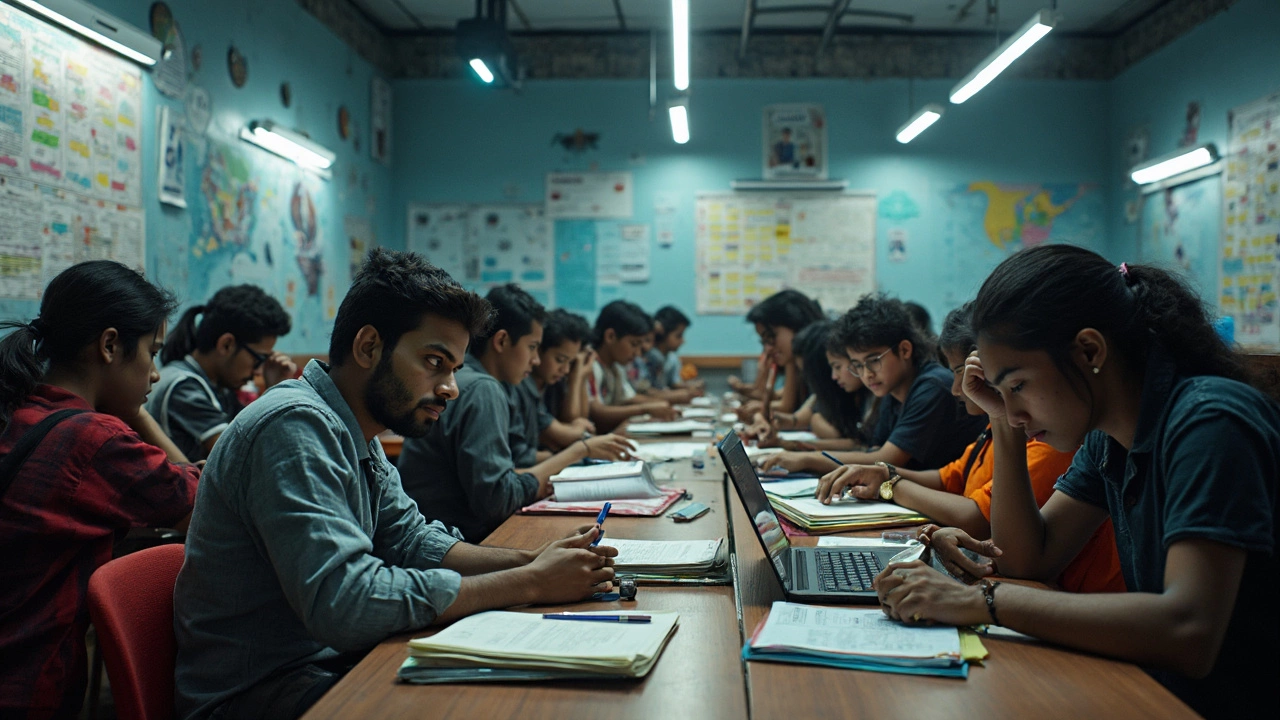
Ask anyone who’s studied late into the night with coffee and panic, and you’ll get a different answer: bar exam, MCAT, USMLE, CFA, and the list keeps going. So which exam actually snags the title as the toughest in the USA? It depends on how you slice it. Are we measuring failure rates, sheer volume of material, the mind games involved, or just how much a bad score knocks your dreams sideways?
Some of these tests, like the California Bar Exam, have pass rates that make people sweat bullets—sometimes barely nudging past 40%. Medical exams like the MCAT or the USMLE can drag you through years of prep just for a shot at the next step. Then there are the super-academic types, like the Putnam Math Competition, where getting any points at all feels like winning the lottery.
If you’re hunting for tips and info that actually help, you’re already in the right place. The next sections dig into the facts—who passes, who fails, what makes these tests brutal, and how people actually survive them. If you think your last finals were bad, just wait till you see what’s next.
- Defining 'Tough': What Makes an Exam Brutal?
- Bar Exam, MCAT, or USMLE: The Heavyweights
- Insider Tips from Real Test Takers
- Why Does the US Love Tough Exams?
Defining 'Tough': What Makes an Exam Brutal?
When people talk about the toughest exam in the USA, they’re not just guessing or bragging about war stories. There are some clear markers that make an exam really hard.
- The sheer volume of content: Some exams throw entire textbooks at you. The MCAT, for example, expects you to recall details from biology, chemistry, psychology, and critical thinking—all in one go.
- Time pressure: Some tests, like the CFA or the California Bar Exam, make you answer tough questions in a race against the clock.
- Crazy-low pass rates: When less than half the people clear a test, it’s not just hard—it’s brutal. Check out the stats below for an idea.
- Application of knowledge over memorization: Exams like the USMLE don’t just want you to know stuff—they want you to show exactly how you’d use it in real life.
- The weight of the result: Failing isn’t just disappointing—it can mean another year of prep, lost money, or a stalled career.
These reasons are why people dread, respect, and sometimes fear these competitive tests. If you’re eyeing up the toughest exam USA has to offer, it pays to know what you’re really facing.
| Exam Name | Avg. Pass Rate (2024) | Main Challenge |
|---|---|---|
| California Bar Exam | 45% | Vast legal content, strict grading |
| USMLE Step 1 | 93% (U.S. med schools), 74% (international) | Reasoning under pressure, real-life scenarios |
| MCAT | 52% (score high enough for med school) | Interdisciplinary knowledge, time crunch |
| CFA Level 1 | 37% | Heavy math, finance concepts |
| Putnam Math Competition | Less than 1% score over 50% | Mind-bending problems, creative thinking |
You’ll notice it’s not always the hardest content. Sometimes, it’s about how much you need to juggle, the pressure, and what’s actually at stake. Brutal, right?
Bar Exam, MCAT, or USMLE: The Heavyweights
When most people argue about the toughest exam USA has to offer, three names float to the top: the Bar Exam, MCAT, and USMLE. These are no ordinary bubble-sheet quizzes—they’re brutal, career-defining hurdles that eat up years of people’s lives. Here’s what makes each one so awful… and, honestly, impressive.
The Bar Exam is a monster for law grads. Take California, for example—its pass rate in July 2024 was just 48%. Some states, like Wisconsin, don’t even bother with it for in-state grads, but places like New York and Texas put thousands of future lawyers through the wringer twice a year. You get two days of essays, multiple-choice, and performance tests that cover everything from constitutional law to random contract rules you maybe saw in week two of class.
The MCAT is what every aspiring doctor faces before med school. It’s a 7.5-hour beast split into four sections, with way more than half of test-takers taking it a second (or third) time for a competitive score. The average score to get into a top 10 med school in 2024? Over 518 out of 528. It’s not just about memorizing facts; it’s really about applying them to weird, stressful scenarios. There’s a reason most people drop $2,000+ on prep courses alone.
Then you’ve got the USMLE—three steps, endless pain. Step 1 alone can make or break your medical residency. The pass rate for U.S. med students stays high, but for international grads it’s way lower (usually below 60%). Step 1 became pass/fail in 2022, but competition hasn’t chilled. You’re looking at over 300 pages of core concepts, weeks of flashcards, and practice exams until your brain melts.
| Exam | Length | Pass Rate (2024) | Key Challenge |
|---|---|---|---|
| California Bar Exam | 2 days | 48% | Massive content, essay writing, time crunch |
| MCAT | 7.5 hours | Varies (approx. 50% get into med school) | Complex topics, long duration, intense competition |
| USMLE Step 1 | 8 hours (Step 1) | 95% (U.S. grads) / 60% (international) | Depth of knowledge, high stakes, very broad topics |
If you know someone who’s prepping for these, don’t expect to see them in public much. High pass rates for some of these exams are misleading because most people who even sit for them have already survived tough filters just to get there. The combination of detail, pressure, and life-changing stakes is what really puts these exams in a league of their own.

Insider Tips from Real Test Takers
If you want to survive the toughest exam in the USA, you need more than just knowledge—you need a battle plan. Over the years, folks who've taken the MCAT, USMLE, and Bar Exam have been pretty open about what actually worked for them. Here’s what keeps showing up.
- Start Early, Stay Steady: Nearly every top-scorer says cramming is a trap. For the MCAT, most high scorers studied at least 300-350 hours. The CFA? You’re looking at 300 hours per level. The bar exam? Law grads often start prepping 10-12 weeks out, full-time.
- Practice Like It’s Game Day: Doing practice tests under timed conditions is non-negotiable. USMLE takers said they did 5-8 full practice exams, and reviewed their mistakes line by line. Real questions = real confidence.
- Don’t Study Alone: Study groups, or at least online forums, help you catch mistakes before test day. Bar exam coaches say talking things out (even to your dog) helps you drill concepts fast.
- Find Your Gaps Early: Top MCAT scorers track wrong answers. They use charts, tables, whatever it takes to spot patterns. No hiding from weak spots.
"By the time I sat for the California Bar, I'd taken over 60 practice essays and 2,000 multiple choice questions. I failed a lot of them, but reviewing what I got wrong every night was my secret weapon." — Alicia Davis, JD, UCLA
Let’s get real: sleepless nights are common. But lack of sleep hurts, so people going for medical exams schedule practice tests at the exact time as the real one, even if it means waking up early for months.
Thinking numbers work better for you? Check out this rough breakdown:
| Exam | Average Study Hours | Pass Rate (2024) |
|---|---|---|
| California Bar Exam | 400-600 | 41% |
| MCAT | 300-350 | Approximately 43% (medical school acceptance) |
| USMLE Step 1 | 500-600 | ~97% (US/Canada schools) |
| CFA Level 1 | 300 | 44% |
The toughest exam in the USA is less about the questions and more about discipline. What separates those who walk out victorious is ruthless honesty about what you know—and more importantly, what you don’t. And if you bomb a practice test? Good. That’s where the learning happens.
Why Does the US Love Tough Exams?
The US has a crazy obsession with tough exams, and it’s not just for bragging rights. A lot of this comes down to competition. Schools, employers, and licensing boards use these super-hard tests to pick out who really knows their stuff. When you hear about low pass rates on the California Bar or the MCAT, that’s by design—it’s supposed to weed out all but the most prepared candidates.
There’s also the belief that a tough test guarantees quality. If you’re seeing a doctor or hiring a lawyer, you want to know they survived one of the toughest exams USA has tossed their way. It builds trust in the system. For example, the USMLE Step 1 makes future doctors memorize insane amounts of info, while the CFA exam basically crushes anyone who isn’t obsessed with finance. That way, only the most committed actually make it through.
Schools play a part, too. Ivy Leagues and top med schools want to keep their standards sky-high, so they depend on these high-stress tests. For students, passing these exams is almost like a secret handshake or club entry—you prove you can handle insane pressure and competition.
This ‘survival of the fittest’ approach does have a dark side though. Critics argue these tests can favor people with money and free time for expensive prep courses. Plus, they’re stressful enough to cause real burnout. Still, until someone invents a better way to sort out the top candidates, America’s love affair with tough exams isn’t going anywhere.





